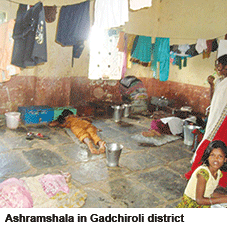 The reportedly continuous abuse and rape of tribal children in the 10-14 age group by teachers and staff of ashramshalas — 1,000 class I-X boarding schools established by the state government of Maharashtra and private trusts for the education of socio-economically underprivileged tribal and forest communities — has provoked national outrage.
The reportedly continuous abuse and rape of tribal children in the 10-14 age group by teachers and staff of ashramshalas — 1,000 class I-X boarding schools established by the state government of Maharashtra and private trusts for the education of socio-economically underprivileged tribal and forest communities — has provoked national outrage.
Opposition parties and social activists allege that the state’s BJP-Shiv Sena government, which was voted to power in Maharashtra in October 2014, failed and neglected to act on the report of a probe committee constituted by the state government’s tribal development ministry which warned of sexual harassment of girl children at tribal boarding schools several months ago. The committee, chaired by Dr. Subhash Salunke, former director-general of health services, was constituted last May following news reports indicating that Maharashtra suffers the largest number of unnatural deaths of tribal children — 684 between 2010-15 — countrywide. The committee presented its report to the Maharashtra governor, C.V. Rao on October 19.
Citing a specific instance of sexual abuse of minor children by perverted teachers and staff, the Salunke Report targets the Ninaji Kokre Adivasi Ashramshala (estb.1998) in the state’s Buldhana district which has 250 students on its muster rolls and is promoted and managed by the Ramchandra Maharaj Sevabhavi Mandal, a private trust. According to the report, a nine-year-old class IV girl, repeatedly raped at knifepoint, was found to be pregnant when she went home during the Diwali vacation in the last week of October.
Currently, over 450,000 children including 100,000 girl children are being schooled in 556 government and 552 government-aided private ashramshalas in Maharasthra with the state government having provided Rs.370 crore in its 2016-17 budget for their education and welfare. These schools provide residential education to children with a paltry Rs.900 per capita per month provided for their board, lodging and tuition and Rs.100 towards teachers’ salaries. Unsurprisingly, the schools lack the most basic facilities such as drinking water and toilets. According to the Salunke Report, most children study and sleep in the same room and even girl children are obliged to bathe under open taps.
Given the grudging provision made for their education and denial of the most basic facilities, child mortality is high in Maharashtra’s ashramshalas. The Salunke Committee reports 417 deaths (220 boys and 197 girls) in these schools during the past three years (2013-October 2016). In 67 percent of these mortalities, the causes cited were “unknown cause”, “sudden death” and “severe illness” with over 31 children committing suicide.
“Despite facing continuous abuse and neglect in government-owned and supported ashramshalas, tribal children have no one to turn to. Their parents are usually illiterate and very poor and therefore anxious to avail the free food and education provided to their children. Given the open corruption and nepotism in teacher recruitment, the educators in these schools are far from qualified to teach, let alone counsel students,” says Yashwant Badole, secretary of the Adivasi Janjagruti Bahuddeshiya Shikshan Sanstha, an NGO focused on tribal education and welfare.
Following submission of the Salunke Committee’s report to the governor, the latter had issued directives to the government to ensure that senior policewomen make periodic visits to the schools to interact with girl children in confidence. And reacting belatedly, chief minister Devendra Fadnavis has directed the state government’s ministries of social justice and women and child development to constitute a group of women officers to supervise all ashramshalas in the state. Simultaneously, two officers of the ministry of tribal development have been suspended for failing to sufficiently monitor these schools and plans to install CCTV cameras and hire professional security guards for ashramshalas are under “active consideration” of the state government.
But as usual, the root cause of the failure of Maharashtra’s over 1,000 ashramshalas and government schools — recruitment of unqualified and under-qualified teachers with minimal interest in children’s learning and development — is unaddressed. In a nation in which primary-secondary education is teacher rather than child-centric and the teaching profession is a sinecured haven for kith and kin of politicians and bureaucrats, scandals of this type are inevitable and hapless children will continue to suffer.
Dipta Joshi (Mumbai)